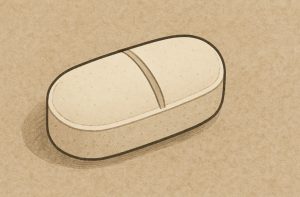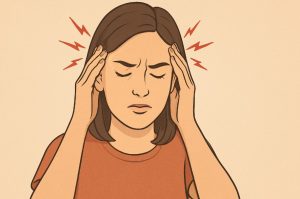Famotidine, a widely used acid-reducing medication, is often taken to relieve symptoms of heartburn, gastroesophageal reflux disease (GERD), and other acid-related digestive issues.
However, many healthcare providers and patients find it especially effective when taken at night. This timing is not random, it aligns with how your body produces stomach acid and the way famotidine works.
In this blog, we will explore why night-time dosing can be more beneficial, the conditions it treats, how it compares to other medications, the right dosage, and important precautions.
By the end, you’ll gain a thorough understanding of the best practices for taking famotidine at night to optimise its effectiveness.
What is Famotidine Used For?

Famotidine belongs to a class of medications called H2 (histamine-2) blockers, which help reduce the amount of acid the stomach produces.
This acid suppression helps treat and prevent several gastrointestinal conditions. Famotidine works by blocking histamine receptors in the stomach lining that trigger acid secretion.
It is most commonly sold under brand names like Pepcid and is available over the counter as well as by prescription. Its quick onset makes it ideal for on-the-spot relief and for preemptively controlling acid before meals or bedtime.
It’s particularly beneficial for people with chronic acid-related issues, offering both short- and long-term relief depending on the dosage and regimen prescribed.
Its role in preventing nocturnal acid breakthrough is one of the reasons it’s gaining popularity for night-time use, especially among those who struggle with reflux-related sleep disturbances.
What Conditions Is Famotidine Commonly Prescribed For?
Famotidine is used to treat a variety of gastrointestinal disorders where stomach acid overproduction is a central concern. These include:
- Gastroesophageal reflux disease (GERD)
- Heartburn and indigestion
- Peptic ulcers (stomach and duodenal ulcers)
- Zollinger-Ellison syndrome (a condition involving excessive stomach acid production)
Doctors may also recommend famotidine for short-term use in people experiencing episodic heartburn, especially related to food, alcohol, or stress.
It is sometimes used in combination with other medications like antacids or proton pump inhibitors (PPIs) when stronger acid suppression is needed.
It’s considered safe and effective for long-term management in many adults and can be especially helpful for those needing continuous acid control overnight.
Why Take Famotidine at Night?
Taking famotidine at night is effective because it aligns with your body’s natural gastric acid rhythms. The stomach produces more acid during the late evening and overnight, especially when you’re lying down.
This excess acid can worsen conditions like GERD or trigger nocturnal heartburn, which can disrupt your sleep. By taking famotidine before bed, you suppress the acid production, providing relief throughout the night.
What Are The Benefits That Include?
-
Reduced risk of acid reflux while sleeping
-
Improved sleep quality by minimizing discomfort
-
Less chance of acid-related coughing or choking during the night
-
Enhanced healing of the esophagus in GERD patients
A study published in PubMed confirms that a 10 mg dose at night can significantly reduce sleep interruptions caused by acid reflux.
Timing is key, taking famotidine 30 to 60 minutes before bed ensures maximum effectiveness. This approach is especially helpful if you’ve eaten a late dinner or frequently experience heartburn at night.
Is Famotidine More Effective at Night Than During the Day?

While famotidine is effective at any time of day, its impact may be more pronounced at night, especially for those who experience nocturnal acid reflux.
That’s because your body’s circadian rhythm causes increased acid production when you’re at rest.
During the day, gravity helps keep acid in your stomach. But at night, lying flat can make it easier for acid to rise into the oesophagus.
Famotidine, by reducing acid secretion during this vulnerable period, offers more targeted relief for night-time symptoms.
Research and clinical observations show that bedtime dosing leads to better overnight acid control, and reduces symptoms that interfere with sleep.
Therefore, for people who don’t have consistent issues during the day but struggle with night-time reflux, a night-time dose is often the most beneficial.
How Does Famotidine Compare with Omeprazole and Other Acid Reducers at Night?
Famotidine and omeprazole are both used to treat acid-related disorders, but they work in different ways and have distinct advantages depending on the time of day.
- Famotidine (an H2 blocker) acts quickly, usually within an hour
- Omeprazole (a proton pump inhibitor or PPI) takes longer to activate but lasts longer
At night, the faster action of famotidine makes it preferable for people seeking immediate relief from night-time reflux.
In some cases, doctors even recommend combination therapy: omeprazole in the morning for long-lasting control, and famotidine at night for breakthrough symptoms.
Key Comparisons
- Famotidine works well for on-demand relief
- Omeprazole is ideal for long-term acid suppression
- Famotidine causes fewer drug interactions
- Famotidine is less likely to cause nutrient malabsorption
Therefore, if night-time symptoms persist despite morning PPI use, famotidine at night can be an effective solution.
What’s the Recommended Dosage and Best Timing for Night-Time Famotidine?

The dosage for night-time famotidine use varies depending on the severity of symptoms and whether it’s being used for occasional relief or long-term acid suppression.
It works by reducing stomach acid production, helping to prevent nighttime heartburn and reflux symptoms.
Typical Dosages Include
- 10 mg for mild heartburn relief: Suitable for occasional acid reflux or indigestion.
- 20 mg for moderate acid suppression: Commonly recommended for frequent heartburn or GERD.
- 40 mg for severe or chronic reflux: Used for persistent symptoms under medical supervision.
Best Practices for Timing
- Take famotidine 30 to 60 minutes before bed: This ensures the medication is active when acid production peaks at night.
- Can be taken with or without food: Though taking it on an empty stomach may enhance absorption.
- Avoid eating within 2 hours before bed for best results: Prevents acid buildup and nighttime reflux.
Your doctor may recommend a single night-time dose or split dosing based on your condition. Always follow the exact dosage instructions on your prescription or over-the-counter label.
Taking famotidine consistently at the same time each evening ensures optimal acid control, especially for chronic conditions like GERD.
Can Taking Famotidine at Night Improve Sleep and Quality of Life?
Night-time acid reflux doesn’t just disturb your digestive tract it can deeply impact your sleep quality, energy levels, and mental focus the next day.
Famotidine helps by reducing overnight gastric acid production, especially when taken before bed. This prevents acid from flowing back into the oesophagus, which can trigger chronic coughing, throat irritation, and nighttime awakenings.
By minimising these disruptions, famotidine allows for more consistent and restful sleep, helping you wake up refreshed rather than fatigued.
It can be especially life-changing for those who have tried lifestyle changes like elevating the head of the bed or adjusting meal times without much relief.
Adding famotidine as a night-time medication can be the final puzzle piece in managing reflux symptoms.
It not only improves physical comfort but also restores emotional wellbeing and productivity by eliminating sleep-interrupting discomfort. For many, this leads to a notable improvement in their overall quality of life.
Are There Any Side Effects or Risks Associated with Night-Time Use?

Although famotidine is generally safe and well-tolerated, especially at night-time doses, there are still potential side effects and risks to be aware of.
Common reactions include headache, dizziness, constipation, or diarrhoea, which are usually mild and short-lived.
More serious but rare side effects could involve confusion, particularly in elderly patients, allergic reactions, or irregular heart rhythms. These effects are uncommon, especially when the medication is taken as directed.
However, people using famotidine long-term should be monitored by a healthcare professional to ensure its continued suitability and to prevent any potential complications.
Stopping the medication suddenly after prolonged use could also lead to a rebound increase in stomach acid, so it’s best to discuss any dosage changes with your doctor.
For most people, night-time use poses minimal risk, especially if it’s not taken alongside other interacting medications. Awareness and regular check-ins are key to safe, effective use.
What Should You Avoid When Taking Famotidine at Night?
To get the most from your night-time famotidine dose, it’s important to avoid certain foods, medications, and behaviours that can reduce its effectiveness or worsen acid reflux symptoms.
Avoid These Before Bedtime
- Spicy or greasy foods, which can trigger excess acid and worsen heartburn.
- Acidic drinks like orange juice or soda, increasing stomach acidity levels.
- Alcohol and caffeine, both of which relax the lower oesophageal sphincter muscles.
- Smoking, as it weakens stomach acid barriers and delays healing.
- Large or late meals, which put pressure on your stomach and cause discomfort.
Medications to Be Cautious With
- Antacids, which may interfere with famotidine absorption and reduce effectiveness.
- Blood thinners or anti-seizure drugs, leading to potential adverse reactions.
- Certain sleep medications that may interact negatively and disrupt digestion.
Helpful Tips
- Don’t lie down immediately after eating to prevent acid reflux symptoms.
- Maintain a healthy weight, as excess belly fat increases reflux risk significantly.
- Practice stress reduction techniques, as anxiety can increase acid levels drastically.
By avoiding these triggers, you allow famotidine to work more efficiently through the night.
How Should You Store and Take Famotidine Tablets Properly?
Proper storage and correct usage of famotidine ensures it remains safe, stable, and effective, especially when taken regularly at night. Like many medications, it’s sensitive to moisture and heat.
Storage Guidelines
- Store in a cool, dry place below 25°C to maintain effectiveness.
- Keep the tablets in their original packaging to prevent moisture damage and contamination.
- Ensure the container is kept out of reach of children for safety reasons.
Taking Famotidine the Right Way
- Swallow the tablet whole with a glass of water for proper absorption.
- Do not crush or chew, as this may affect how the drug is absorbed and its effectiveness.
- Always follow the dosing instructions exactly as prescribed by your doctor.
If you miss a dose, take it as soon as you remember, but skip it if it’s almost time for your next scheduled dose. Do not double up.
For those on long-term therapy, setting a daily reminder can be helpful in taking the medication at a consistent time each night, which enhances its long-term efficacy.
When Should You Speak to a Doctor Before Using Famotidine at Night?

Even though famotidine is available without a prescription, certain conditions require medical guidance before starting or continuing its use, especially at night.
You should consult a doctor if:
- You experience frequent reflux symptoms (more than twice a week)
- You’re already taking other medications, as interactions may occur
- You’re pregnant or breastfeeding
- You have a history of kidney or liver issues
- You’re over 65, as older adults are more prone to certain side effects
Additional warning signs include difficulty swallowing, unexplained weight loss, black stools, or persistent chest pain.
These could be symptoms of something more serious than standard heartburn, such as an ulcer or gastrointestinal bleeding, and require medical evaluation.
Speaking to a healthcare provider ensures that famotidine is not only safe for your specific health status but also the most effective treatment option available. They may suggest alternative therapies or combine treatments for better results.
Conclusion
Famotidine is a proven, reliable solution for managing night-time acid reflux, heartburn, and GERD symptoms. Its fast-acting acid suppression makes it especially valuable before bed when your body naturally increases acid production.
By reducing reflux, famotidine can help you sleep better and prevent long-term damage to the oesophagus.
Whether used alone or alongside a morning PPI, famotidine offers flexibility and convenience in acid management.
However, it’s essential to follow the right dosage, timing, and lifestyle practices for the best results. As always, consult your healthcare provider for personalised guidance tailored to your health condition.
FAQs About Why Take Famotidine at Night
Can you take both omeprazole in the morning and famotidine at night?
Yes, many doctors recommend this combination to control acid throughout the day and night, especially for those with persistent GERD.
Is it okay to take famotidine right before going to bed?
Yes, taking it 30 to 60 minutes before bedtime is ideal for suppressing night-time acid production.
How long does it take for famotidine to start working at night?
Famotidine typically begins to work within 30 to 60 minutes, making it effective for fast night-time relief.
Can famotidine help with silent reflux while sleeping?
Yes, it can reduce acid levels and prevent silent reflux symptoms like cough or sore throat during the night.
Does taking famotidine at night cause drowsiness or insomnia?
Famotidine does not typically cause drowsiness or insomnia, but if you notice sleep changes, speak to a doctor.
Should you take famotidine with food or on an empty stomach at night?
Famotidine can be taken with or without food, but avoid heavy meals before bed to maximise effectiveness.
Can children or elderly patients take famotidine before bedtime safely?
Yes, with proper dosing and medical guidance, it is generally safe for both children and elderly individuals.






